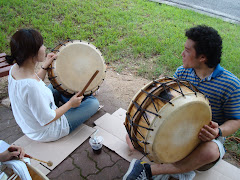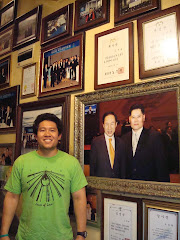Just recently at the hasukjib I received an interesting comment. One of the girls noticed I hadn't shaved for a while due to the fact that I had a pretty shaggy beard, and she commented on this. At first, I wasn't sure if this was a mere observation or complaint. I hadn't shaved for probably a couple weeks, mostly because of my laziness and indifference to appearance. And obviously, it had caught the attention of this girl and Nuna as well. I guess having facial hair is pretty noticeable here, since most Korean men don't have very much of it. Although the attention to and consciousness of one's outward appearance are very high here, I haven't felt like I needed to go out of my way to fit the fashion trends here. In the end, I shaved this weekend, but will probably let it grow back out again. I know my mom is not going to be happy about this story (Sorry!).
Ever since I started learning Korean, one of the things that I always had a hard time understanding was the use of 존댓말 (formal speech) and 반말 (informal speech). 존댓말 is used whenever you are talking to someone older than you or are meeting someone for the first time and don't know whether or not this person is older or younger than you. 반말 is used amongst close friends and towards people younger than you. Switching between the two, or more importantly, knowing when to switch between the two, continues to be very difficult and often awkward for me. Depending on which speech you use, a relationship between the two speakers is established. In this sense, Korean is a very hierarchical language in which it is important to know the level and standing of the two people talking. Interestingly enough, one of the first things Korean people of my age usually ask me when we first meet is what age I am. This is to verify which form of speech is to be used between us. If I am just one year older than them, I am entitled to use 존댓말 (formal speech). Unfortunately, I was unaware of this until recently, and because of my lack of discernment to know which form of speech to use, I basically have only been using 반말 with everyone I meet. Because I am a foreigner, however, I am cut some slack. If Korean was my native language I probably would be reprimanded for using improper forms of speech and breaching the hierarchical social standards . I am still trying to understand the intricacies and social undertones behind these different forms of speech, and still get mixed up when and where to use them.
I've also wondered how the different forms of speech affect the levels of intimacy between the speakers, if there is any influence at all. For example, using 반말 (informal speech) could signify the closeness of the relationship. If you and your friend have a close relationship, despite your difference in age, you can choose to use 반말 with each other. However, when I use 반말 I sometimes feel as if I am being disrespectful or looking down on the person I'm addressing. Perhaps this is just a misconception. Is using 반말 a sign of our close relationship, or does it convey disrespect and disregard for social standards? Thus, it becomes very hard to know what exactly you are conveying with the form of language you are using. Obviously, when a mother speaks 반말 to her child (like Nuna), this is not a sign of disrespect but rather a sign of love and affection perhaps, right?
Using 존댓말 (formal speech), on the other hand, seems to convey submissiveness to an older person, although I'm not sure if this is the right interpretation either. It is used to show respect when speaking to someone older than you. However, if it only shows signs of respect, can a level of intimacy ever be reached through 존댓말? Or is there always going to be a degree of separation between the speakers?
I think I've just confused myself even more after all this talk. I'm sorry if I've confused you as well.






















































































































Hey, I once yelled at the dog in the alley to shut up -- in formal speech! The kids in the alleyway at the time nearly died laughing.
ReplyDeleteYou'll get the hang of it. The fact is 1) there are easy to follow rules, like always use formal speech to somebody older than you (they'll give you permission to drop this, if they want), and 2) not following those rules can either create intimacy or distance.
For example, you can switch to formal speech with somebody you'd normally be close to, and the effect is chilling. Informal speech, as you know, can also create a sense of disregard or disrespect as desired.
So: You just have more nuanced control over the impression you want to give. It's actually quite cool! =)